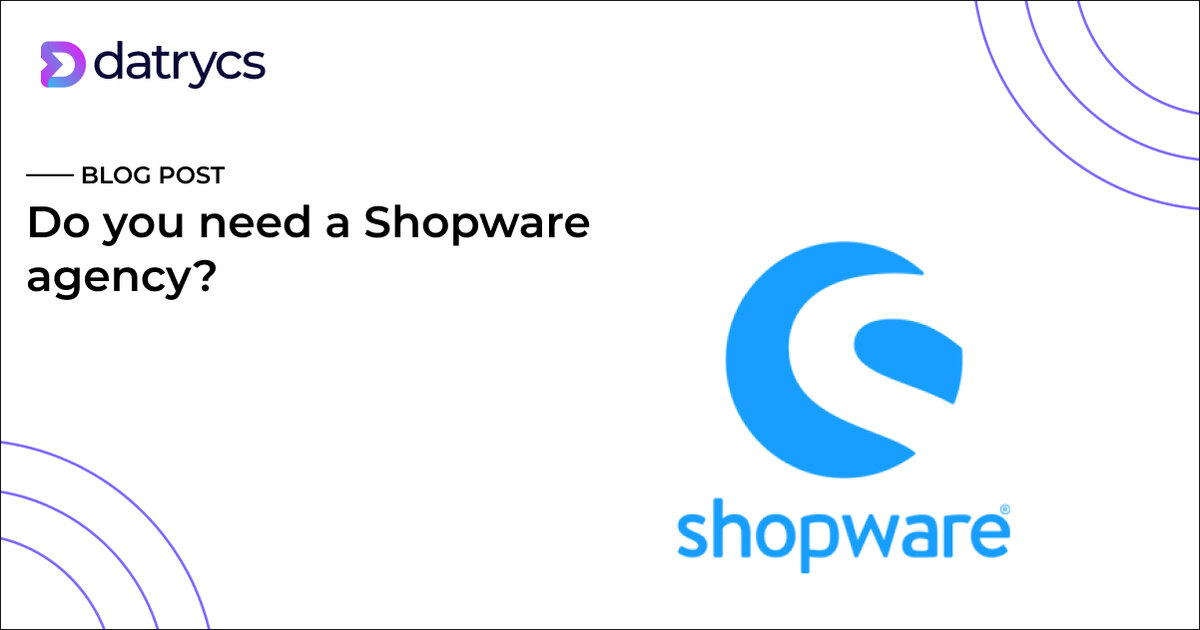Mastering the do's and don'ts of Shopware for a successful eCommerce business
At datrycs, we understand the intricacies of Shopware and help businesses unlock its full potential.



Shopware offers significant advantages for businesses looking to create a flexible, scalable online store. Whether you're a small business or an enterprise, Shopware can meet your needs, but only if it is used strategically. This guide highlights the platform's strengths, common traps and why a skilled partner is key to success.
Understanding the Strengths of Shopware
It has a high level of customization
The high level of customization is one of Shopware’s greatest strengths. You can tailor every aspect of your shop to suit your business model with its open-source framework, including managing your account for extensions, licenses, and store settings. Shopware gives you the tools to innovate and personalize, whether it’s custom storefronts, dynamic product recommendations or creating a seamless omnichannel experience.
For example, imagine you run a fashion retail business that needs to display different collections depending on the customer’s location. With Shopware’s open-source framework, you can customize your storefronts to show users from different regions customized product ranges. You can even integrate dynamic product recommendations that change based on a customer’s previous shopping behavior, helping you to increase engagement and conversions. Furthermore, by creating a seamless omnichannel experience, you can ensure that customers can browse in-store inventory online, purchase through any channel and even choose flexible delivery options - all while maintaining a consistent brand experience.
This level of personalization and flexibility makes Shopware an ideal choice for businesses with unique needs or complex product offerings.
Shopware has an extensive plugin library
Shopware’s extensive plugin library is a treasure trove for online store owners looking to enhance their store’s functionality. With over 3,500 plugins available, you can easily find the perfect solution to meet your specific needs. Whether you need to integrate new payment gateways, add advanced shipping options, or implement powerful marketing tools, Shopware’s plugin library has got you covered.
For instance, if you’re looking to expand your payment options, you can quickly add popular gateways like PayPal, Stripe, or even local payment solutions with just a few clicks. Need to improve your shipping process? There are plugins for that too, allowing you to integrate with major carriers and offer real-time shipping rates. And when it comes to marketing, you can find plugins for email marketing, social media integration, and even advanced analytics to track your store’s performance.
With new plugins being added regularly, you can stay up-to-date with the latest e-commerce trends and technologies, ensuring your store remains competitive and innovative.
Shopware comes with strong SEO capabilities outside of the box
Shopware comes with strong SEO capabilities outside of the box, including customizable URLs, meta tags, and sitemaps. This enables you to optimize your store’s search engine visibility, driving organic traffic and improving rankings without relying heavily on third-party SEO tools.
Suppose you’re running an online furniture store, and you want to improve your store’s visibility on search engines. With Shopware’s built-in SEO features, you can easily create customizable URLs that include relevant keywords like “modern-sofas” or “wooden-dining-tables,” making your product pages more search engine friendly. You can also edit each page’s meta tags—like the title and meta description—ensuring your site delivers clear, keyword-rich information to search engines for better rankings.
Additionally, Shopware can automatically generate sitemaps, helping search engines like Google crawl and index your site more effectively. With these built-in tools, you can optimize your store’s search visibility and drive organic traffic to your site, all without needing to invest in third-party SEO solutions.
By utilizing Shopware’s native SEO capabilities, you can significantly boost your rankings and improve customer acquisition through search engines, helping your business grow organically.
It offers multi-store capabilities and seamless third-party integrations
If you’re planning to scale your business, Shopware is designed to grow with you. It offers multi-store capabilities and seamless third-party integrations, which allow you to manage everything from one platform as your business expands into new regions or markets.
Imagine you own an online beauty brand that’s expanding internationally. You want to open stores for different regions, each offering country-specific products and pricing. With Shopware’s multi-store capabilities, you can easily set up multiple storefronts for different countries, all managed through a single backend. Each store can have its own language, currency, and localized product catalog, while still maintaining a centralized management system for inventory, orders, and customer data.
Additionally, as your business grows, you can integrate third-party tools for logistics, CRM, and marketing automation seamlessly into your Shopware ecosystem. For example, you could connect with a global shipping provider to offer local delivery options or integrate with a CRM tool to manage customer relationships across different regions.
This ability to manage multiple stores and integrate new systems effortlessly as you scale makes Shopware an ideal platform for businesses looking to expand into new regions or markets without the complexity of managing separate platforms. You can also request license transfers through the online system, ensuring proper communication and verification with the sales department.
Community and Support
One of the standout features of Shopware is its thriving community of developers, merchants, and partners who are passionate about e-commerce. This vibrant community is committed to helping each other succeed, offering a wealth of knowledge and support.
Through community-driven initiatives like forums, meetups, and hackathons, you can connect with like-minded individuals and stay up-to-date with the latest developments in the world of Shopware. These events provide valuable opportunities to learn from others, share your experiences, and collaborate on new ideas.
In addition to the community support, Shopware offers comprehensive resources to help you get the most out of your online store. From detailed documentation and tutorials to FAQs and webinars, you have access to a wealth of information at your fingertips. These resources are designed to help you navigate the platform, troubleshoot issues, and implement best practices, ensuring your store runs smoothly and efficiently.
Do’s of Using Shopware
Make sure you have done everything to improve the site performance
Website speed is very important so you can have a successful ecommerce store. Make sure to enable caching, use a Content Delivery Network (CDN), and optimize images to reduce loading times. Shopware offers tools for caching, which stores frequently accessed data to speed up the site. A faster site means better user retention and improved conversion rates.
Use what Shopware has to offer to create the shopping experience everyone dreams of
Shopware provides the flexibility to create a tailored shopping experience. Carefully selecting the right words in your dynamic product groups, custom storefronts, and personalized product recommendations based on user behavior can enhance user engagement and ensure clarity. These customizations will improve user engagement and increase sales by ensuring each shopper gets a personalized experience.
Use the plugins, which Shopware offers to expand your engagement
Shopware boasts a huge library of plugins to extend your store’s functionality. From SEO to payment gateways and marketing tools, plugins can enhance your store’s performance. Choose well-reviewed plugins that are actively maintained and updated. Plugins for customer reviews, newsletter integration, and social media sharing can help expand your store’s reach and engagement. Additionally, write engaging and relatable content to further enhance user engagement.
To boost your online visibility, invest in SEO optimization for your Shopware store
Search engine visibility is key to growing your online business. Shopware offers built-in SEO tools, including customizable meta tags, structured data, and sitemaps. Ensure you are using these features effectively by adding relevant keywords to product descriptions, optimizing URLs, and generating rich snippets. Regularly updating content and implementing best SEO practices will boost your site’s organic traffic. Adapting writing styles to suit the audience and context is also crucial for better SEO performance.
To increase the security of your Shopware store and stay competitive with the latest e-commerce trends, regularly update your Shopware version, licenses, and plugins
Always keep your Shopware version and plugins up to date. New updates often come with important security patches, performance improvements, and new features. Staying on top of updates not only ensures your store remains secure but also keeps it in line with the latest e-commerce trends and technologies.
Dont’s of Using Shopware
Don’t overload your store with plugins
While plugins are useful, overloading your store with too many can slow down performance and introduce compatibility issues. Avoid relying too heavily on plugins; instead, focus on the essentials and be selective in what you add. Regularly audit your plugin usage to ensure they aren’t conflicting or negatively affecting the site’s speed. Using a conversational tone can also help engage your readers and make the content more relatable.
Avoid ignoring Data, Analytics, and Insights
Data is important to the success of your e-commerce store, but it’s often overlooked. Don’t ignore Shopware’s built-in analytics or external tools like Google Analytics. Monitoring key metrics such as conversion rates, cart abandonment, and user behavior allows you to make informed decisions to improve your store’s performance.
Don’t neglect security
Security should never be an afterthought. Failing to regularly update Shopware and its plugins, neglecting SSL encryption, and overlooking GDPR compliance can expose your business to cyber threats and legal issues. Make security a priority by following best practices like enabling two-factor authentication and maintaining up-to-date software.
Don’t underestimate the importance of hosting
Your hosting provider plays a crucial role in your store’s performance. Opting for cheap, underpowered hosting will hurt your store’s speed and reliability. Don’t skimp on hosting - choose a provider that can support Shopware’s demands with strong uptime, scalability, and fast server response times. Additionally, write engaging and relatable content to enhance user engagement.
Migration and Upgrade
Migrating to Shopware 6 or upgrading from an earlier version can be a complex process, but with the right guidance and support, you can ensure a smooth transition. Shopware offers a range of resources to help you plan and execute your migration or upgrade, including detailed documentation, informative webinars, and hands-on training sessions.
For example, if you’re migrating from Shopware 5 to Shopware 6, you can access step-by-step guides that walk you through the entire process, from preparing your data to configuring your new store. These resources help you understand the nuances of the migration, ensuring you don’t miss any important steps.
Additionally, Shopware’s partner network includes experienced agencies and developers who can provide expert guidance and support throughout the process. These partners can help you transfer your data, settings, and customizations to your new online store, minimizing downtime and ensuring a seamless customer experience.
With Shopware’s migration and upgrade tools, you can easily transfer your data, settings, and customizations to your new online store, ensuring a smooth transition and continued success for your business.
Conclusion: The need for skilled partner
Navigating the complexities of eCommerce requires more than just setting up a storefront. While the platform offers a wide range of powerful tools, without the right expertise you may struggle to fully leverage its strengths or avoid costly mistakes. This is where an experienced partner like datrycs becomes essential.
At datrycs, we understand the intricacies of Shopware and help businesses unlock its full potential. From optimizing your store's performance to ensuring seamless integrations and maximizing scalability, we have the expertise to ensure your Shopware store is both powerful and efficient.
Contact us now to take your Shopware store to the next level. Whether it's improving performance, implementing bespoke solutions or integrating new systems, datrycs has the expertise to ensure your eCommerce platform runs smoothly, scales efficiently and remains competitive. Let us help you avoid costly pitfalls and unlock the full potential of Shopware for your business success.


